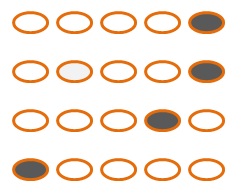Today’s guest post comes from Peter Kotowski, a Dissertation Fellow at the McNeil Center for Early American Studies and a Ph.D. candidate at Loyola University Chicago. His research uses the lived experiences of indentured servants to explore Pennsylvania’s development within the Atlantic economy and the extent to which the colony was “the best poor man’s country.”
 In the introduction to their 2008 edited collection, Class Matters, Simon Middleton and Billy G. Smith make the bold proclamation that “as a mode of historical analysis of early North America and the Atlantic World, class is dead – or so it has been reported for the last two decades.”[1] The subsequent collection of essays makes a convincing case that class is not, in fact, dead. For Smith, this volume was merely a continuation of a decades-long commitment to class as a primary mode of analysis. It was in the spirit of Smith’s work that dozens of scholars converged on the McNeil Center for Early American Studies in Philadelphia from November 7-9 for what was affectionately dubbed “Billyfest.”
In the introduction to their 2008 edited collection, Class Matters, Simon Middleton and Billy G. Smith make the bold proclamation that “as a mode of historical analysis of early North America and the Atlantic World, class is dead – or so it has been reported for the last two decades.”[1] The subsequent collection of essays makes a convincing case that class is not, in fact, dead. For Smith, this volume was merely a continuation of a decades-long commitment to class as a primary mode of analysis. It was in the spirit of Smith’s work that dozens of scholars converged on the McNeil Center for Early American Studies in Philadelphia from November 7-9 for what was affectionately dubbed “Billyfest.”
Continue reading



 We’re barreling toward the end of the semester, which always feels closer once Thanksgiving’s over. As the Brits don’t celebrate Thanksgiving here, I’m in the midst of doing mid-semester evaluations with students this week A) To remind them that the semester really is more than half over and B) To try to suss out what is and isn’t working in our class.
We’re barreling toward the end of the semester, which always feels closer once Thanksgiving’s over. As the Brits don’t celebrate Thanksgiving here, I’m in the midst of doing mid-semester evaluations with students this week A) To remind them that the semester really is more than half over and B) To try to suss out what is and isn’t working in our class. Was the purpose of the constitution to protect democracy from being ruined by the people or to protect commerce from being ruined by democracy? This was one of the questions put to Gordon Wood and Woody Holton in a debate held a few weeks ago at the University of South Carolina. A full video of the event has just been released on YouTube, and is embedded below. For anyone familiar with the work of these two historians, the debate will constitute a useful recap of the distinction between their two interpretations of the origins of the federal constitution. And for others, I hope it might be a kind of teaser for their excellent books!
Was the purpose of the constitution to protect democracy from being ruined by the people or to protect commerce from being ruined by democracy? This was one of the questions put to Gordon Wood and Woody Holton in a debate held a few weeks ago at the University of South Carolina. A full video of the event has just been released on YouTube, and is embedded below. For anyone familiar with the work of these two historians, the debate will constitute a useful recap of the distinction between their two interpretations of the origins of the federal constitution. And for others, I hope it might be a kind of teaser for their excellent books!  It’s been a busy week of headlines for early Americanists: to the links!
It’s been a busy week of headlines for early Americanists: to the links!